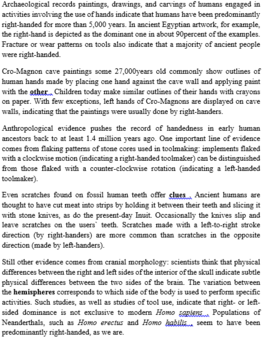Read the following passage and mark the letter A, B, C or D on your answer sheet to indicate the correct answer to each of the questions.
Recent research into the world of teenagers has suggested that they value friendship above everything else. Children aged between 12 and 15 were asked what was important to them. Their answers included possessions such as money and computer gadgets but also relationships with people. The teenagers questioned said that friends were the most important to them, more even than family, or boyfriends and girlfriends.
We wanted to find out more about the results of this research so we asked our readers what they thought about the value of friendship. Here are some examples of what they said about their friends:
Ben, 15:
Every time I have a fight with my parents, I need some time on my own. But after that, the first thing I do is meet up with my friends. After playing football for a while, or skateboarding, I usually feel much happier again.
Rory, 13:
When I moved to a village in the countryside, I thought that it would be the end of my friendships. But my old friends have kept in touch and they come and visit during the holidays. There’s a lake nearby, so we often go sailing, waterskiing or windsurfing. And I have made some new friends here too, at school, since I joined the rugby club.
Carlos, 11:
Last year, I broke my arm on a skiing holiday. Unfortunately, it was my left arm and I am left-handed. My school friends all helped and copied their notes for me.
It seems that our readers value their friendships very highly. From what they told us, they spend a lot of time with their friends, just hanging out, or sharing hobbies and interests. They seem to need their friends for advice, help, chats, and for having fun. Clearly, friends make each other feel better. Looking at what our readers told us, the results of the recent research are not really surprising.
28. Why are Ben, Rory and Carlos mentioned in the article?
A. They know why teenagers value friendship.
B. They read magazines.
C. They give information about themselves.
D. They are teenage boys.
29. Which of the following best describes Ben?
A. He often has fights. B. He is happier than his friends.
C. He likes being alone. D. He likes some sports.
30. What do we know about the lake that Rory visits?
A. It is near the school.
B. It is used by a lot of people who do water sports.
C. It is near his home.
D. It is a village.
31. Carlos mentions that he is left-handed because ………………………...
A. it makes skiing harder
B. it makes it worse that he broke the arm he uses most
C. it is an interesting fact about himself and he was talking about his left arm
D. it is very unfortunate when you break your left hand
32. The answers to the recent research and the answers from the readers …..
A. were surprising B. were similar
C. were not the same D. were both about sports



